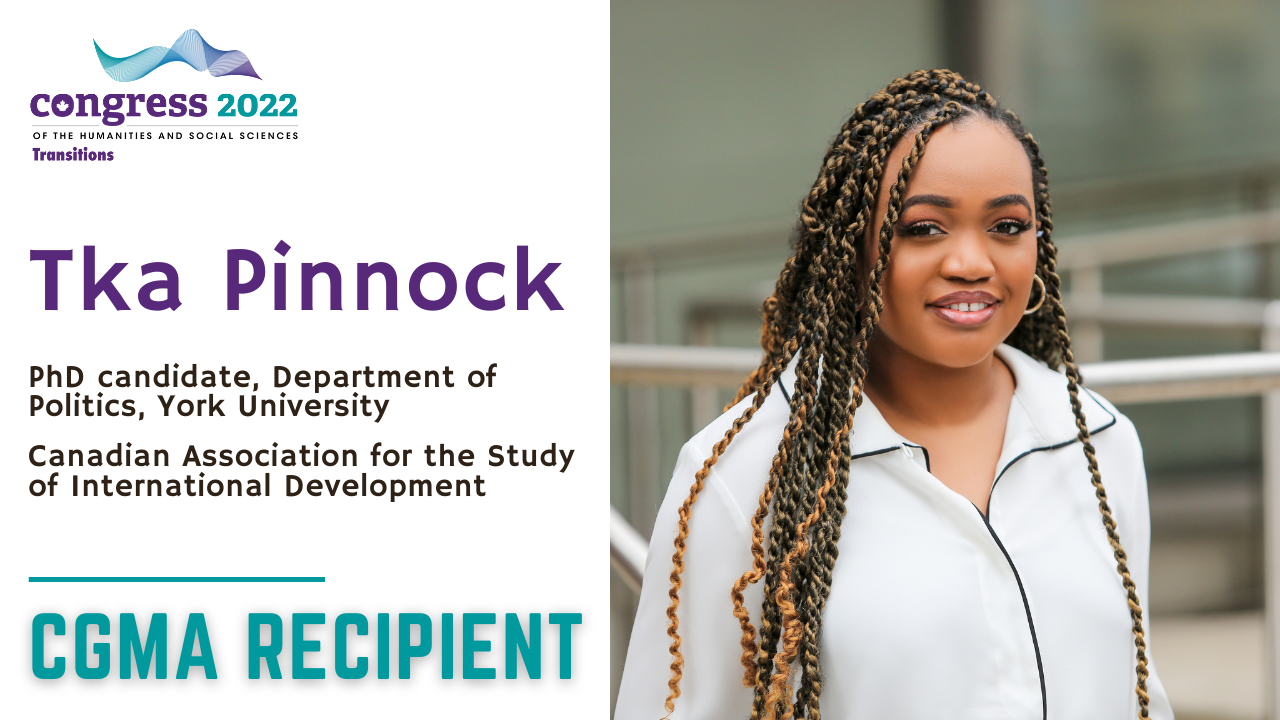Nominated by member scholarly associations of the Federation for the Humanities and Social Sciences, the 2022 Congress Graduate Merit Awards recognize exceptional graduate students who will be presenting their work at the Congress of the Humanities and Social Sciences.

Tell us about yourself.
PhD Candidate, Department of Politics, York University
My research interests lie at the intersection of feminist political economy, political ecology, and critical development studies where I explore how marginalized workers in the global south feel and respond to the conditions of economic development, using Jamaica’s tourism sector as a case study.
List the scholarly association(s) of which you are currently a member.
Canadian Association for the Study of International Development
Canadian Political Science Association
At which conference(s) will you be presenting and/or attending?
Canadian Association for the Study of International Development
What is the title of your Congress 2022 presentation?
I am presenting a paper titled: “Development and Human Insecurity: The Case of Jamaica’s Tourism Sector.” I am an organizer and chair of a roundtable with four fantastic scholars and teachers: “The classroom as political? Teaching ‘Development’ for Decolonial Imaginations, Radical Futurities, and Global Justice”
How would you describe the research you will be presenting at Congress 2022?
Tourism is an important sector in the Jamaican economy. So much so that at the height of the COVID-19 pandemic in mid-2020, the Minister of Tourism stated that opening the borders to tourists was a matter of “economic life or death.” Yet, many who live and work in tourist towns – mostly Afro-Jamaicans – do not benefit from the wealth in the sector. Instead, they have lost their livelihoods and livelihood strategies. I make the case that the state’s work to secure economic development through tourism generates insecurities for marginalized workers and poor communities deemed obstacles to progress.
How does the research you will be presenting connect with the Congress 2022 theme, Transitions?
The theme Transitions begs us to ask what we are transitioning from, what are we transitioning to, and are we transitioning at all. Much of international development studies and practice focus on how countries in the global south can transition from their current economic state to a more developed state. Critical development scholars emphasize how little the global system has changed such that rich countries remain rich, and poor countries remain poor. My presentation looks at how developing states in the pursuit of economic development – in the pursuit of change – often end up exacerbating the insecurity and marginality of those already on the margins. In other words, what we deem as ‘progress’ is dependent on the disposability, dispossession and exploitation of marginalized peoples and communities.
What is your favourite part of the Congress experience?
I was a first-time attendee and presenter in 2021, and though it was virtual, I was appreciative of and impressed by attendees’ engagement with and interest in the presentations.
Share your hopes for Congress 2022.
I hope that at Congress 2022, as scholars, practitioners and teachers, we will continue the important work of addressing and redressing systemic inequities in academia, and the wider society that we seek to change through our research and knowledge production. I also look forward to meeting and engaging with my peers and senior colleagues, who are doing important and exciting work in international development. Congress provides a space for me to learn and expand the boundaries of my own work.
